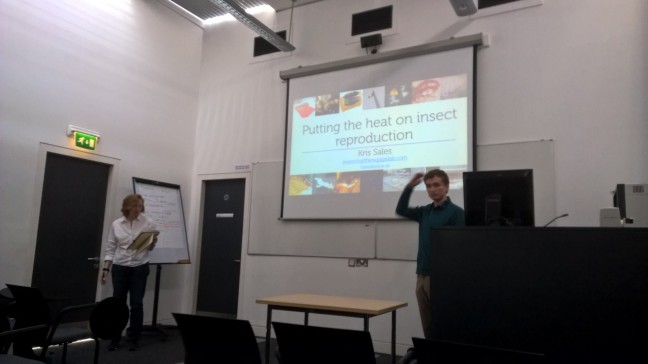Last week saw the annual Rebellion conference organised by the Centre of Ecology, Evolution and Conservation (CEEC) PhD students. As expected, the conference attracted a wide range of academic interests and luckily for those in the crowd they were treated to a concentrated dose of Gage lab research topics.
All of Matt’s post docs and PhD students presented talks this year in what was a highly engaging conference. First up was Kris Sales, currently in his second year of his PhD, who fired up the crowd with his talk titled ‘Putting the heat on insect reproduction’. Kris presented the issue that 1. heatwaves are becoming more hazardous 2. stressed natural populations are shifting ranges or even disappearing 3. we don’t know what vulnerable biological traits can explain this. He built a compelling case of evidence showing that it is specifically male reproduction which is the weak link during heatwaves. Only a relatively small subset of Gage lab data could be displayed in the slot; stay tuned for what aspects of sperm are vulnerable, if heatwaves have transgenerational impacts and whether reproduction can adapt to warming.
Next up was one of Matt’s three post docs, David Murray, who presented a fishy tale “Assessing Reproductive Function and Fillet Quality in Triploid Atlantic Salmon”. David spoke about the problems facing the aquaculture industry and how the research being done in Matt’s lab might aid the industry by making it more sustainable and environmentally friendly. Towards the end of the talk David dropped a few bombshells suggesting that triploid Atlantic salmon aren’t as sterile as previous scientists have suggested and how more research was needed to optimise their use within the industry.
After David came Matt’s newest post doc, Jo Godwin giving a master class on the role of sexual selection within natural selection. Jo’s talk (Does sexual selection improve population fitness) explained that although sexually selected traits can be costly, sexual selection could benefit populations by favouring high condition, and reducing mutation load. To find out more, Jo is using the Tribolium sexual selection regimes which have been evolving for over 8 years under monogamy versus polyandry. The results show that invasion ability is increased when individuals have a history of polyandry, and the ongoing ‘extinction vortex’ is producing really interesting data!
Last, but not least, Matt’s senior post doc Ram Vasudeva entered the fray and delivered a detailed account of his research so far with his talk “Adaptive Thermal Plasticity in Sperm & egg form & function. Temperature is the most significant abiotic factor affecting life on our planet. Most organisms cope with unpredictable temperature variations via genetic adaptation (across generations) and/or phenotypic plasticity (within a generation). Much of the phenotypic variations documented across species are in traits such as body size (e.g. Drosophila) but, very little is known about how temperature impacts gamete form and function. Ram’s research sheds light on how temperature shifts impact gamete form and function in the red flour beetle (Tribolium). He showed that the expression of sperm and egg phenotypic optima follow opposite directions and that it is driven by short-term plasticity and not genetic fixation. Importantly, the key aspect of our results show that within-generation plasticity in sperm and egg phenotypic optimum translates to adaptive significance in terms of its function in the environment it was produced
The Gage lab participation was complete with the main man himself Prof. Matt Gage, chairing a session, during which he had to step in to prevent anymore mint humbugs related injuries from an exuberant PhD student wanting to reward good questions!
In between the Gage lab participation there were fantastic talks on a diverse range of topics including where jellyfish sit in the marine trophic level, Koala phylogenetics and conservation forensics to name but a few. The organisers did a fantastic job and we would like to take this opportunity to thank each of them for giving us an opportunity to present at their conference.
Until next year Rebellion, we salute you!
